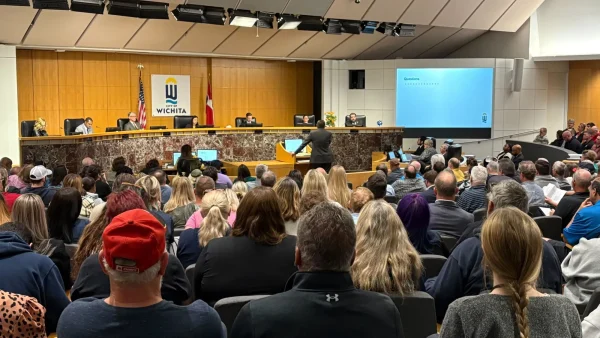Full transcript: Q&A with Secretary of State Mike Pompeo
[embedyt] https://www.youtube.com/watch?v=Pnj-JEoLG7A[/embedyt]
During his campus visit Friday, Secretary of State Mike Pompeo sat down for a seven-minute interview with The Sunflower. Topics included Ukraine, how the secretary navigates difficult conversations with President Trump, and whether or not Pompeo would ever entertain a White House bid.
The Sunflower: We genuinely do thank you for taking time for student press.
Mike Pompeo: No, you’re most welcome. Sorry we don’t have more time.
SF: So you’ve quickly risen to be arguably President Trump’s closest adviser. He’s said, quote, “I argue with everyone except Pompeo.” So as a trusted adviser with a strong personal rapport, how do you navigate those conversations when you have to have more difficult conversations — when you have to tell the president you think he may be wrong about something?
MP: Look, it happens with some frequency. My responsibility is really very, very clear. It is to work with the State Department team to develop options for the president, or recommendations for the president. “Hey, here’s how we think we ought to approach this particular problem set.” To lay out why we think that’s the case. When we’re headed in the wrong direction, I have a deep, deep obligation to tell the president, “Hey, I just — I think we’re headed in the wrong direction. Here’s how I think we ought to course correct. Here’s why.”
But in the end, when he makes his decision, my mission is to carry that out and to go deliver. The American people elected him the president of the United States. He has the ultimate responsibility, and so my obligation extends to making sure every day that we have those conversations. When I think he’s got it wrong, I’m diligent in articulating the reasons I think we’ve got it wrong, and then providing a set of options that help us get to what I believe is a better place.
SF: Thank you. Bill Taylor, a fellow West Point grad, who has served in every administration since 1985 — both parties — testified before the House. White House line characterized he and others as “radical unelected bureaucrats.” I know you responded briefly to that yesterday, but I’m curious, do you still have confidence in your top Ukranian diplomat?
MP: I don’t talk about personnel stuff. It’s not fair to any of the team, but I’ll say this. I have a responsibility in this big organization. I’ve watched Bill — he and I have talked about Ukranian policy at some length. How do you take down corruption? How do you now help the new leader there, President Zelensky? How do we deliver on America’ national security interests? And he and I — full accord on that. He and I both share this vision for how American interests in Ukraine can properly be represented. I have every reason to think that he’s still out there, banging away at that problem set.
But I will say this: We all, as human beings, can get it wrong, too. We see things through a certain prism. We address things in a certain way. We all have a responsibility to make sure we’re getting it as right as we can each and every day. So, I don’t think by nature of the fact that I work at the State Department means I get everything right every day. I think that’s true for all the people who work at the United States Department of the State. In fact, I have seen State Department officials engaged in behavior that is not appropriate — that wasn’t right, that didn’t reflect the highest values of the foreign service and American diplomacy around the world. So, my obligation as the organization’s leader is to sort through that, to parse through it, to make sure that we collectively are delivering on behalf of the American people each and every day.
SF: So, you are on campus today encouraging students to consider public service — particularly in the State Department. So, I’m curious, to have a career diplomat, their reputation’s kind of disparaged publicly, after the former diplomat was unceremoniously removed — what is your pitch to those people that you’re trying to to recruit? Those young people you want to get into public service. But what’s a life of public service if partisan politics can irreparably damage your reputation?
MP: Yeah, I think the predicate of your question is just wrong.
SF: In what sense?
MP: The American people understand that these folks who go do these remarkable things — I was just talking this morning to a group here at Wichita State about some amazing work that a fellow did in Syria just this last handful of weeks. A dangerous environment, passing real-time information to us so that we could complete, the vice president could complete the negotiations that we did in Ankara. That’s amazing work at significant personal risk and incredibly professional, capable of getting this information to the right place in a timely way.
Look, there’s noise in Washington D.C. People say things. People challenge you. People will say they think you’ve got it all wet. Politics is everywhere — it’s not just here in the United States. It’s all around the world too. You watch, I watch my counterparts at the foreign ministries or the leaders around the world — their domestic, political audience — they’re challenging them too. Sometimes people use language that makes sense. Sometimes they may use language that doesn’t.
When you commit to a life of public service, and this is what I told the students I was with, when you commit to a life of service, what you do every day is stay focused on the mission, right? You came to want to be at the State Department because you wanted to go have an impact on the lives of American national security and the lives of people all around the world. You came with a purpose — stay focused on that purpose. Stay true to the truth, stay truth to the mission set, and when you do that, the noise — what people say, the things that are supportive of you or things that aren’t supportive of you, won’t impact what it is you came to do. If you know that — if you know why you’re there and why you’re doing what you’re doing, then I think that life as an officer, as a diplomat in the United States Department of State is a glorious place to go spend some part of your life serving America.
SF: So, everyone’s asking you about the potential Senate bid. I’m not going to do that, but I am curious, under what circumstances might you ever consider running for president?
MP: You know, I think anyone who thinks about taking on that awesome duty has to have a deep-seated belief that they can make a difference. You have to have a reason, a rationale where the case. If there came a time in my life that I believed that it was something that I could do, or I could make a difference, or I could have a real impact on the lives of the people of the United States, I’d consider it.
This country has given me and my family so much. I’ve had so many opportunities because this country gave me a chance to run a small business, and the opportunity to speak my mind, and to be elected as a member of Congress, and to be the director of the CIA, and to worship in my faith and to teach a Sunday school class All of the things that sometimes, frankly, we take for granted here in America.
I feel that I do owe this nation a deep debt, and so, if there’s any time in my life that there’s a chance to serve — whether that’s to serve in a role somewhere or in a government office, or in the private sector, or even back in government, Susan and I are committed to this life, which recognizes that we have an obligation to give back to this great country. So, if the opportunity presented itself where I thought that was the case, I’d certainly think about it.
SF: Thank you very much. We genuinely appreciate it.
MP: Thank you very much.

Matthew Kelly is a former editor-in-chief and managing editor for The Sunflower. Kelly graduated in 2020 with a bachelor’s degree in political science...










Anonymous • May 4, 2021 at 1:48 pm
Can I ask a question